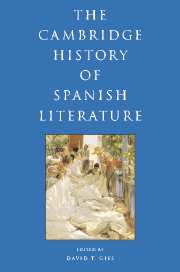Book contents
- Frontmatter
- I INTRODUCTION
- II HISTORY AND CANONICITY
- III THE MEDIEVAL PERIOD
- IV EARLY MODERN SPAIN: RENAISSANCE AND BAROQUE
- V THE ENLIGHTENMENT AND NEOCLASSICISM
- VI THE FORGING OF A NATION: THE NINETEENTH CENTURY
- VII THE MODERN, MODERNISMO, AND THE TURN OF THE CENTURY
- 32 Nineteenth-century women writers
- 33 The Catalan Renaixença
- 34 Great masters of Spanish Modernism
- 35 The poetry of Modernismo in Spain
- 36 Modernism in Catalonia
- 37 Modernist narrative in the 1920s
- 38 Noucentisme
- 39 Ideas, aesthetics, historical studies
- 40 The Catalan Avant-Garde
- VIII TWENTIETH-CENTURY SPAIN AND THE CIVIL WAR
- IX IN AND OUT OF FRANCO SPAIN
- X POST-FRANCO SPANISH LITERATURE AND FILM
- Bibliography
- Index
- References
33 - The Catalan Renaixença
from VII - THE MODERN, MODERNISMO, AND THE TURN OF THE CENTURY
Published online by Cambridge University Press: 28 March 2008
- Frontmatter
- I INTRODUCTION
- II HISTORY AND CANONICITY
- III THE MEDIEVAL PERIOD
- IV EARLY MODERN SPAIN: RENAISSANCE AND BAROQUE
- V THE ENLIGHTENMENT AND NEOCLASSICISM
- VI THE FORGING OF A NATION: THE NINETEENTH CENTURY
- VII THE MODERN, MODERNISMO, AND THE TURN OF THE CENTURY
- 32 Nineteenth-century women writers
- 33 The Catalan Renaixença
- 34 Great masters of Spanish Modernism
- 35 The poetry of Modernismo in Spain
- 36 Modernism in Catalonia
- 37 Modernist narrative in the 1920s
- 38 Noucentisme
- 39 Ideas, aesthetics, historical studies
- 40 The Catalan Avant-Garde
- VIII TWENTIETH-CENTURY SPAIN AND THE CIVIL WAR
- IX IN AND OUT OF FRANCO SPAIN
- X POST-FRANCO SPANISH LITERATURE AND FILM
- Bibliography
- Index
- References
Summary
Although possibly inspired in the contemporary term Risorgimento, the name Renaixença derives from the title of a journal that, from 1871 to 1905, promoted the recuperation of the high-cultural uses of the Catalan language. As a period marker, the term refers to the nineteenth-century retrieval of Catalan culture after the long decline known to Catalan historiography as La Decadència. Pierre Vilar has called the Renaixença “a new datum, in the sense that the [Catalan] language … becomes once more a sign of the social group.” This is indeed the primary and, in retrospect, the decisive meaning of the term, which has come to signify the restoration of the cultural uses of the vernacular. Nevertheless, considering the class tensions that played themselves out in this process, the definition demands more precision. The Renaixença also represented the growing self-assertion of social groups whose recently achieved economic hegemony required cultural and historical legitimation.
While it would be simplistic to mistake the cultural and, above all, the linguistic reclamation for the political will that enlivened this process, it is true that the Renaixença consolidated the values of Catalonia’s economic elite. It is not by chance that a latter-day politician like Jordi Pujol, who championed a comparable retrieval of Catalonia’s language and political personality in the twentieth century, could assert that “Es difícil que la Renaixença, que anava fent el seu procés lentament, hagués pogut produir el canvi sobtadíssim en quantitat i en qualitat que hi va haver si no hagués tingut el suport d’una classe social i d’una economia creixents” (“Without the support of a growing social class and an expansive economy, it would have been difficult for the Renaixença, which advanced slowly, to produce the sudden change in quantity and quality that actually took place”).
- Type
- Chapter
- Information
- The Cambridge History of Spanish Literature , pp. 470 - 478Publisher: Cambridge University PressPrint publication year: 2005



